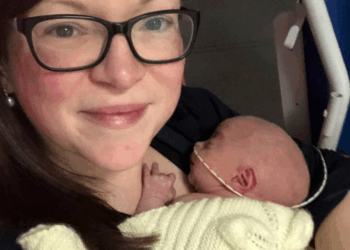Councillor Thomas Heald is a Scottish Conservative councillor for Dunblane and Bridge of Allan, Scottish Conservative and Unionist candidate for Dunfermline and political advisor in the Scottish Parliament.
‘And the award for the most obscure bill title of the year goes to…?’
The Children (Care, Care Experience and Service Planning) (Scotland) (Bill).
I have been unfortunate enough to sit through enough Holyrood announcements over the last decade to know how this story goes.
Ministers unveil a Bill with great intentions, the press releases fly from St Andrews House and families are told that their lives are going to be radically transformed. It’s the all too familiar SNP playbook. But when the cameras switch off, the practicalities land on the desks of councils up and down Scotland and more often than not, the money does not follow.
This bill, which I will call ‘The Promise Bill’ for short, is the latest example.
On paper, it promises the world: more aftercare for care experienced young people, tighter rules on profiteering in residential homes, a new register for foster carers, stronger independent advocacy and new planning structures. In principle, there is nothing to disagree with in terms of it’s aims. Why would anyone not want better support for Scotland’s most vulnerable children? This is again top of the SNP’s playbook of talking the talk, but being found severely lacking when it comes to the walking. In practice, ‘The Promise Bill’, is set up to disappoint because it is, as it stands, not properly funded and because it risks adding bureaucracy instead of delivering real help.
The Scottish Government’s own figures admit this Bill carries millions in extra costs for councils, especially from extending aftercare rights up to age 26. Ministers say the money will be “covered in the settlement”, which is code for burying it inside the general grant, with no protection and no guarantee.
If you’ve ever been part of a council budget meeting, you’ll know what that means: impossible trade-offs. Do we cut libraries to fund aftercare? Do we raise council tax yet again? Every new duty that isn’t ring-fenced forces us to squeeze something else. And residents are already paying more for less.
Through my work on the Social Work and Education Committee and also at Holyrood, I have been fortunate enough to speak with countless care experienced young people. Frankly, they are not asking for the earth. They want the right to a stable home, someone to answer the phone when they’re struggling, and proper mental health support. Extending aftercare is admirable, but unless there are enough social workers, enough housing stock, and enough services to back it up, that “right” will only exist on paper.
We’ve been here before. Ministers make a pledge, but when young people try to use it, they find waiting lists, stretched staff, or no service at all. That gap between promise and practice doesn’t just waste money it breeds distrust among those who’ve already been let down too often.
The Bill also seeks to limit profits in residential care and requires fostering agencies to become charities. Again, the instinct may be understandable. But the care market is already fragile. Councils are scrambling to find placements, and costs are soaring. If providers exit because of clumsy reforms, children will end up being moved further from their families and communities. That undermines “The Promise” rather than keeping it.
Another part of the Bill hands children’s services planning to Integration Joint Boards (IJBs). Anyone who’s watched adult services integration knows how messy this can be: blurred lines of accountability, slower decisions, and more layers of meetings. Children’s services touch education, housing, and youth justice, all core council functions. Pulling them into IJBs risks weakening local democratic oversight. Parents deserve to know who is responsible, not face another faceless structure.
We’ve seen this play before. The National Care Service proposals collapsed because costs weren’t clear, councils weren’t listened to, and the centralising instinct went too far. This Bill is heading down the same road: legislate first, figure out funding later. And once again, it’s local authorities who will be left trying to square the circle.
What would make it work?
It doesn’t have to be this way. If ministers were serious about delivery, they’d do three things.
First, ring-fence the money. Don’t just shuffle it through the block grant. Guarantee councils the resources to deliver aftercare and the other reforms.
Second, phase changes properly. Pilot the aftercare extension, test workforce capacity, and only roll out once we know it can be sustained.
Third, keep accountability local. Anchor children’s services in councils, where parents and communities know who to call when things go wrong.
I don’t doubt ministers care about care-experienced young people. But caring isn’t enough. Warm words don’t hire social workers, don’t keep residential units open, and don’t provide a roof for a young person leaving care. Without proper resources, these reforms will exist only in theory while councils juggle the impossible.
Scotland made “The Promise” to our care-experienced children and young people. They deserve more than legislative headlines. They deserve real services, delivered on the ground, backed by funding and accountability.
Until that happens, this Bill won’t deliver in reality.









![Florida Officer Shot Twice in the Face During Service Call; Suspect Killed [WATCH]](https://www.right2024.com/wp-content/uploads/2025/12/Inmate-Escapes-Atlanta-Hospital-After-Suicide-Attempt-Steals-SUV-Handgun-350x250.jpg)







